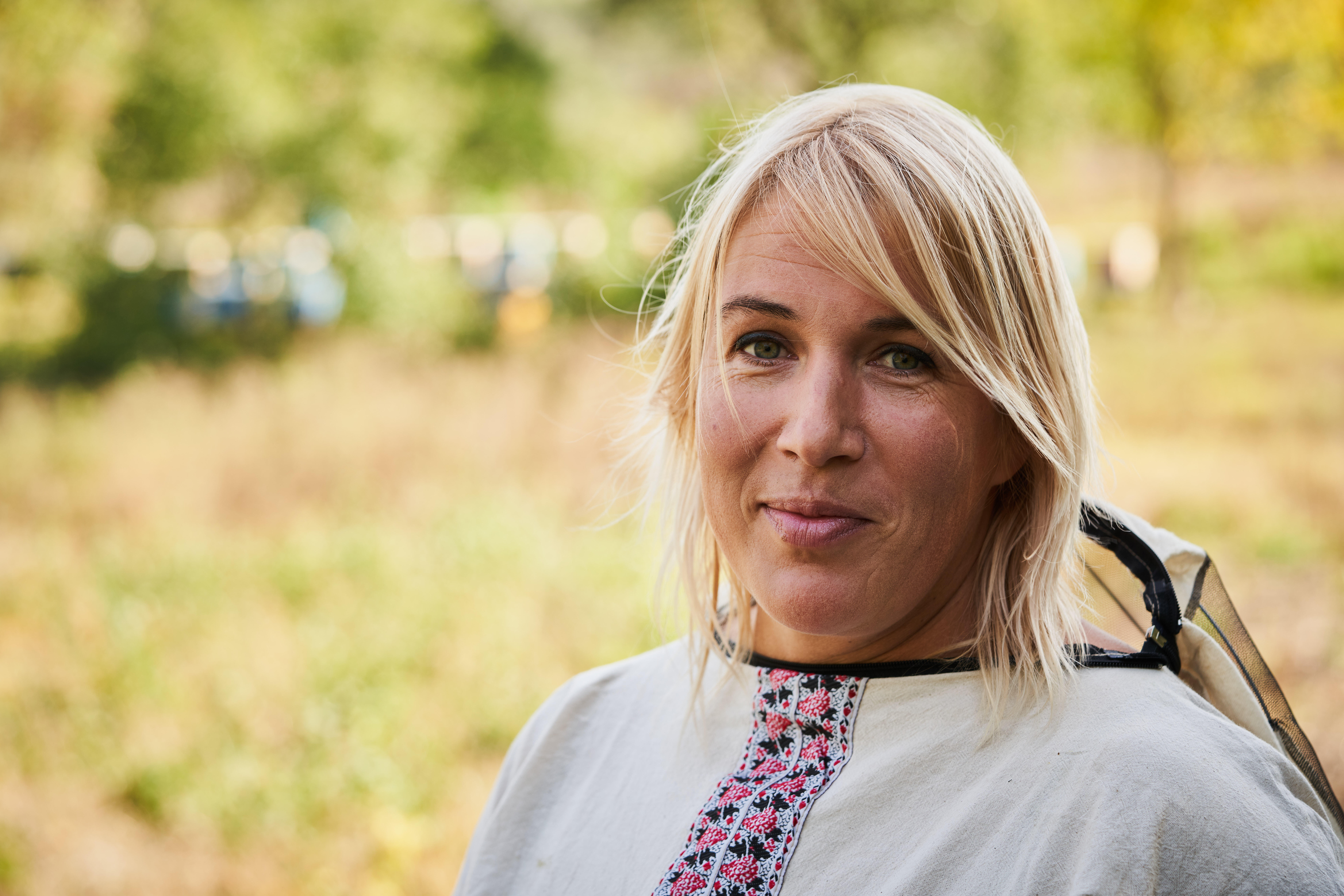Mariia Moseichuk, Poltava oblast
Mariia Moseichuk has been working in the agriculture field for only 2 years. But that hasn`t stopped her from being a successful female farmer and youth mentor. Even though the woman is relatively new at beekeeping, she has some advantages over even experienced beekeepers. With her project to set up the beekeepers` cooperative, Mariia has become a silver medalist of the educational grant program «TalentА», which was initiated by Corteva Agriscience company in cooperation with United Nations Population Fund.
Mariia`s passion for beekeeping began when her friends had invited her to their apiary. It was a moment when she was so hypnotized by working with bees, that she decided to start her own business. Mariia started with an apiary of 15 hives in the village near Kremenchuk and since has expanded to 50 ones. And she won’t stop there.
‘Although I didn`t expect to see my name in a list of «TalentА» program winners, it has convinced me decisively that the way I chose is the right way. And this winning is not just a prize, it`s more of an advance. Because there is still a lot of work ahead,’ farmer claims.
The idea of collaboration with other beekeepers didn’t occur out of anywhere. Mariia realized that she didn`t have enough honey production to enter new markets and trade networks.
Meanwhile, other beekeepers have a lack of resources, knowledge on new technologies and production principles, they don`t know how to promote their products. In these circumstances, as the woman says, launching one factory that will be working following international standards is mutually beneficial cooperation. Mariia has a plan to create an automated line with filling equipment that will be able to dry pollen up and to have a special cream whipping machine. Besides, she wants to make clear communication with customers, so they can see that the product is safe with their own eyes. According to Mariia, some of the beekeepers from other regions already want to join the cooperative.
Mariia`s motto is `not by word but by deed`. So she had started to bring the idea of the cooperative to life even before the results of grant tender were announced. At this point fabric is already renovated, the equipment is bought, and now work is continuing on furniture, preparation of documents to implement quality standards, and legally formalize the cooperative. The official launch is currently scheduled for late April or early May.
Having received public education in beekeeping, the woman is still learning and gaining experience in related fields. Thus, in addition to `TalentA` studying, she completed apiotherapy courses, and also she was selected to the Female Leadership Academy and farmer school. This winter she completed a refresher course on honey beverage and mead brewing.
‘One is never too old to learn. It’s interesting and helpful. ‘TalentA’ gave me the knowledge and the winning motivated me for new achievements. I share my experience just to show that it is possible without corruption, that there are some companies which support small business and care about such problems, as climate changing, lack of access to safe water and biodiversity protection,’ Mariia Moseichuk says.
She passes the acquired knowledge and experience to the youth as a mentor, within Ukraine-wide volunteer program. Supported by the organizers, Mariia has already purchased lavender seedlings for setting up a popular photo zone near the apiary. She has also purchased bee colonies for opening a health-improving apihouse. Moreover, female farmer wants to conduct the excursions to apiary for children. She is confident that together with all it will contribute to the development of agritourism in the united territorial community.
At the same time with her apiary and cooperative, Mariia is dreaming about opening up her bee spa salon in Kremenchuk and already negotiating on that. The woman is sure that in terms of the pandemic when not all people can improve their health qualitatively, such services became relevant.
The female farmer thinks her example is proving, yet again, that you don`t need vast experience to reach your goal, the secret is to keep moving in the right direction steadily.
‘When someone says that I`m just lucky, I resent this. I have been learning a lot, and working on the grant application, on the project. There`s so much behind and there is so much more ahead. Therefore, it`s not a fortune, it`s a logical consequence of my hard work,’ Mariia claims.
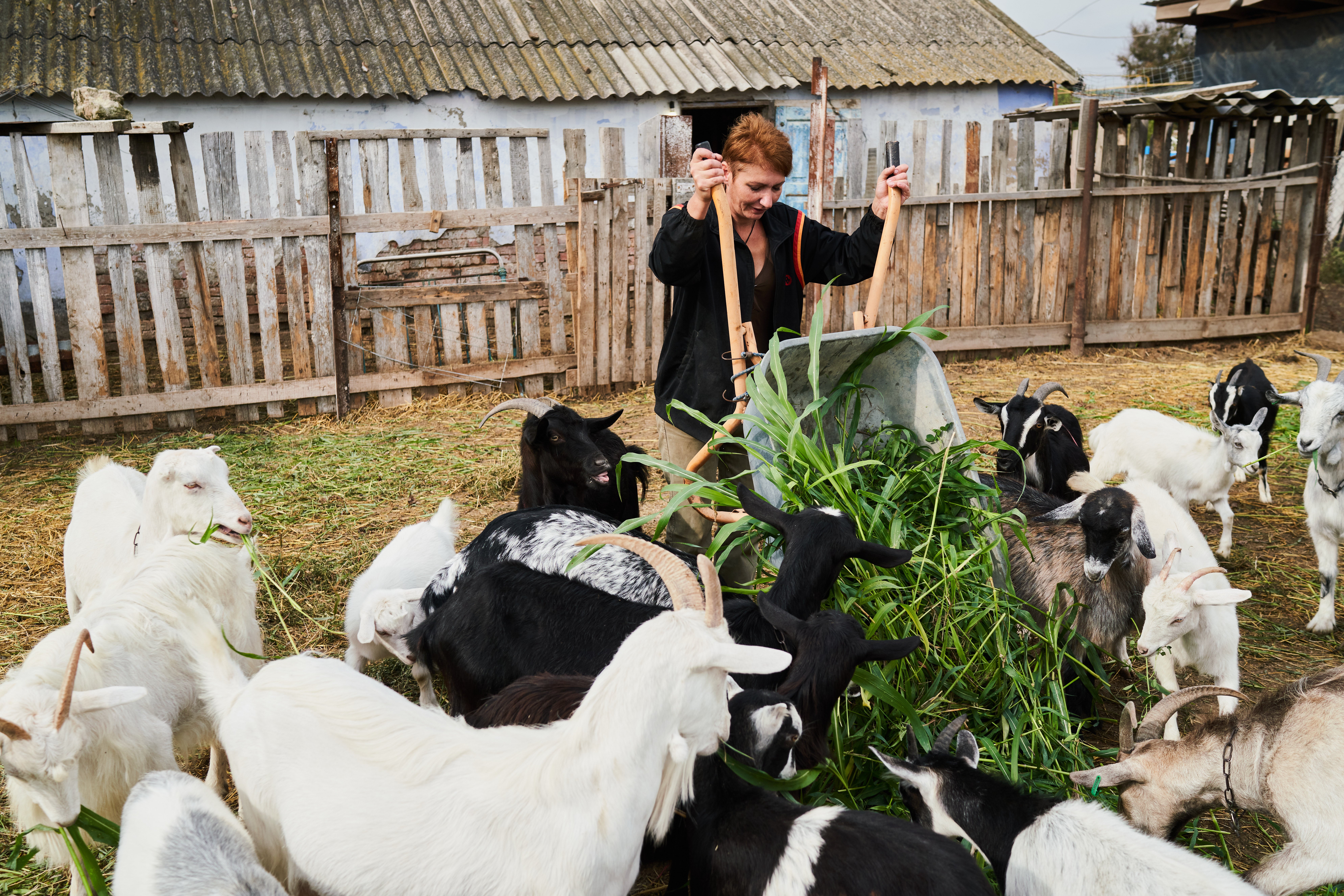
Tetyana Stramnova, Kherson oblast
‘I am thrilled that I got what I want, that they believed in me and my project’, says entrepreneur Tetyana Stramnova. In October 2020, the woman became a bronze medalist of the educational grant program ‘TalentA’ and received $3,000 to open a contact farm for children with autism.
With the outbreak of war in Donbas, Tetyana, a native of Donetsk, had to move to Muzykivka village, Kherson oblast, where she started goat farming. The woman had already had experience in agriculture before.
After giving birth to two kids with special needs, she began breeding birds to feed the children with wholesome and natural meat. Tetyana’s business was started with two goats and a goat, but after a while, her herd expanded to 30 animals. Husband and children help a female farmer to take care of animals.
School teachers claim that interacting with animals made her children develop better than the other kids. That inspired the woman to launch a contact farm for children with special needs, where they could learn how to make cheese and also get a job in the future.
Tetyana has already agreed with the school teachers on training. All lessons with special children will be free, but the proceeds will come from the cheese sales and commercial tours.
Tetyana says her focus has shifted from earning money to the social component of the project after studying with Corteva.
‘I was so fascinated by the idea, it gave me a mission. While earlier I was afraid I would not succeed or I would not be properly perceived with this idea, all doubts disappeared after communication with mentors and parents of other children. I became convinced that the contact farm was what we needed. It was something that such children and their mothers really lacked’, says Tetyana.
And no one can stop her. Even without the support of parents and relatives, the farmer is closer and closer to her goal.
Now the businesswoman's project is under construction. Despite organizational nuances and poor weather conditions, the farm’s launch is planned for the end of April. Then Tetyana wants to start conducting excursions and classes for children with autism. The next stage will be the construction of a separate cheese factory for masterclasses, as, according to quality standards, strangers are not allowed to be at manufacture. Later, the farmer plans to buy a neighboring plot of land to expand the business.
Tetyana claims that due to studying at ‘TalentA’ she has learned to look at her own business soberly. Her attitude on delegating responsibilities, advertising, and even her goats has been transformed. Now the owner of the farm formally cooperates with a veterinarian, animal caretaker, has already agreed with the guide and potential cheesemakers. Moreover, she continues studying and participating in competitions and grant programs. Thus, as a result of one program, the farm was paid for advertising on Facebook, which led to a significant increase in sales and entry into new markets. Now Tetyana realizes that the business lacks their efforts with her husband, it also needs an accountant, a marketer, and an SMM specialist.
In addition to practical skills, participation in the ‘TalentA’ grant program jumpstarted Tetyana’s personal development, and the victory only increased her self-confidence.
‘People around say that I have been transformed a lot during these six months. I have become more principled, persistent, confident in my views. Really, I realized that I know much, so I want, and I can. I see the goal, not the obstacles,’ says the farmer.
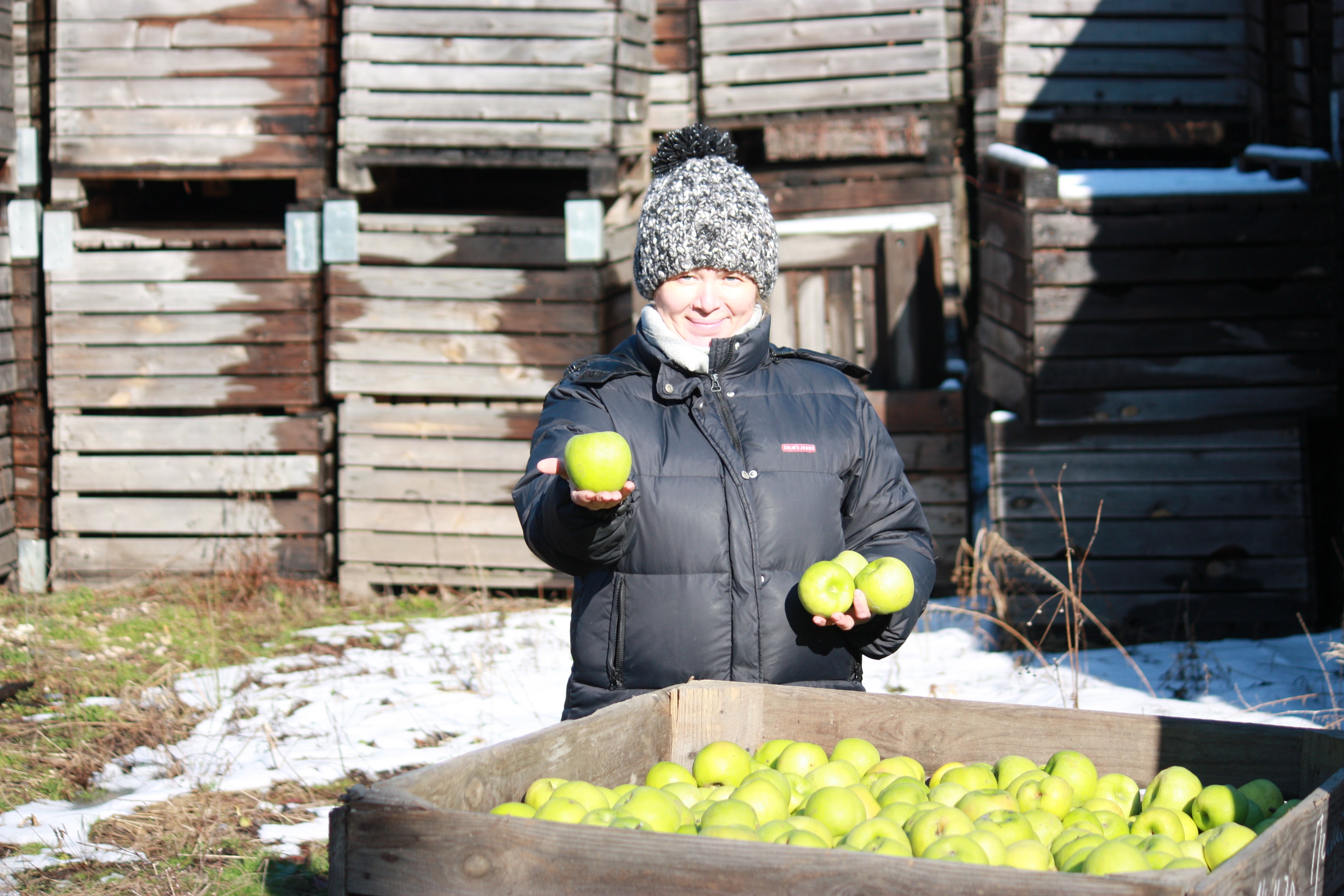
Erika Shapochka, Zakarpattya oblast
Erika Shapochka is a mathematician by training. But she has been working in agriculture for 20 years. The woman started growing cereals but realized in time that they are not suitable for Transcarpathian soils. After all female farmer decided to grow an apple garden, because, as to her, this fruit is aesthetical and healthy. Moreover, it is the most consumed fruit among Europeans, and therefore is in demand throughout the year.
Erica's decision to move from finance to agriculture was considered and conscious. She decided not to experiment, but to rely on the experience of industry experts. For that, together with her business partner, she concluded a contract with a Dutch consulting company, which recommended the appropriate variety of apples, planting scheme, and further aspects of the organization of the garden.
Now together with her partner, Erica runs a cooperative of 7 farms, which employs 50 permanent workers. They cultivate 80 hectares of land and harvest an average of 50 tons per hectare. Products are sold both in Ukraine and abroad.
‘This garden is lifework. It is not just tireless work, it is a special kind of spiritual devotion. It is our inspiration and daily activities without which there will be no result’, says Erica.
Therefore, gaining a sufficient experience of 15 years in horticulture, Erica prepares to launch the «Garden Protection Service» to transfer knowledge, how to properly and safely take care of trees to other farmers. And in the future, she aims to join forces to increase sales. With this project, the woman went to the educational grant program ‘TalentA’, where she has become a bronze medalist.
‘Our philosophy is to reduce the use of pesticides. Often mostly small farmers do so recklessly to ensure their crops. At the same time, they do not think about the consequences of their actions on the environment, on the ecosphere of the garden. Therefore, we seek for balance and want to convey the right message – how, when and what to use in a particular situation,’ says Erica.
According to the woman, the demand for this service is quite high. In her view, people do not know what to do with the garden not to harm it and to get a good harvest.
Business partners spent the grant to purchase gardening equipment and a van to provide mobility for the team. The project is already on track. All needed were bought, technological schemes developed, and even online-site launched. The woman is only waiting for the spring to be launched publicly.
Erika sees universality as a necessary quality of modern agriproducer. Therefore, she always gladly takes new learning opportunities. This was also the case of ‘TalentA’.
‘I was really interested in the course program. The lecturers provided qualified and systematic knowledge that allowed a short-term understanding of the process of analyzing world markets. Now we can easily analyze the needs of different countries in our products and thus adjust the marketing. A special bonus is that our project has received a positive evaluation from the mentors. It has inspired to move forward’, the farmer claims.
In that way, the course of «design-thinking» has prompted me to think about raw material processing. Erica does not want to divulge all secrets but claims that she will do everything to satisfy the needs of the consumer.
Also, a female farmer is interested in the idea of investing in horticulture, using the crowd farming model. It’s the situation when each person can invest in a certain plot of farmland or even in a single tree. It is a significant contribution to business development and at the same time the dividends for the investor.
Erica Shapochka is not going to stop learning as she believes that a successful agriculture business no longer requires the application of old-school methods, but works efficiently with the latest information technologies involvement.
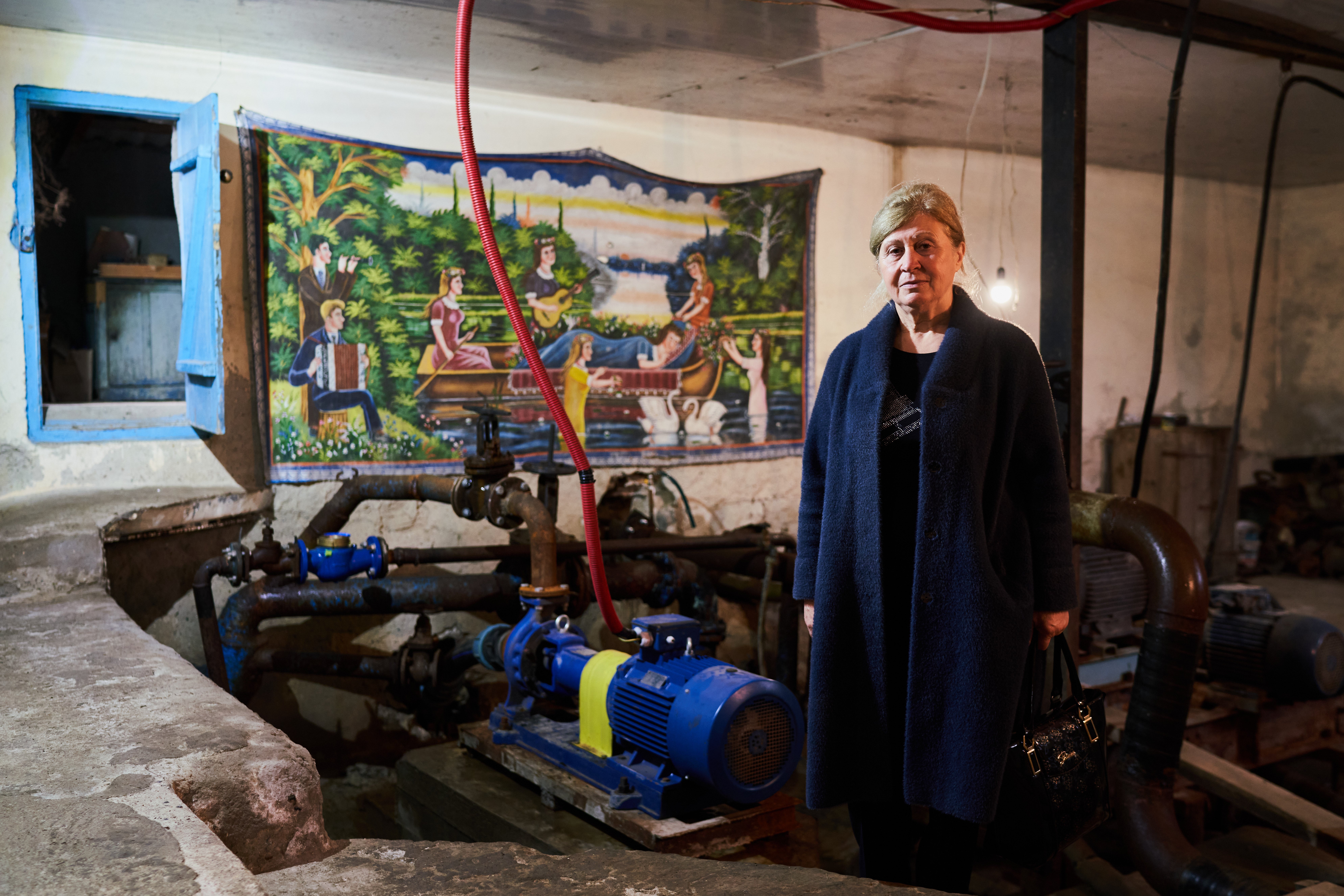
Vira Popaz, Odesa oblast
The life of a female farmer Vira Popaz demonstrates that it can`t be too late to learn something new. She is always on the move, and despite her 40 years of experience in the agriculture sphere, she is still participating in educational programs and grant competitions. Vira`s main goal is to make her native village Kubey, Odessa region, attractive for the tourists and comfortable for its inhabitants. Farmer gathered like-minded people around herself and established a cooperative to approach the goal step by step.
Thus, with her own project on the installation of water treatment facilities in some towns, she has become a gold medalist of the educational grant program «TalentA», which was initiated by Corteva Agriscience company in cooperation with United Nations Population Fund.
‘To be honest, winning first place was absolutely unexpected. When I was announced as a winner, my knees were shaking. You know, as you`re standing in front of the teacher at school. The most pleasant is that our team has won the first grant. It pushed us to take action, motivated us a lot, and boosted our confidence,’ the entrepreneur shares.
It immediately opened up new horizons. In February, Vira Popaz got one more grant for buying an infrared dryer which will allow farmers to process raw materials and make different healthy products. Such a method of processing preserves up to 96% of vitamins and nutrients. The female farmer even considers the possibility of creating her own brand. Besides, after success in ‘TalentA’ program her cooperative has extended from 7 to 12 members.
At this point, together with cooperative partners, Vira is cultivating 30 hectares of the land, where she grows vegetables, fruits, grapes, and berries. Also, she has a plan to install a greenhouse and create a flow-line production. The cooperative hasn`t got a centralized system of product distribution yet, so the products are sold in the local markets. An urgent matter for 7 thousand inhabitants was poor drinking water quality. So this particular project has become a priority issue for entrepreneurs. With the money she had received on ‘TalentA’ program, Vira has already booked treatment plants, and now she is waiting when the weather warms up and she can renovate the building, install plumbing and water treatment facilities and finally launch the cleaning process. After that, the cooperative will supply the united territorial community of Kubey, including schools and kindergartens, with water for free.
But the plans of the ambitious female entrepreneur go further than that. To improve the living standards of the village, she wants to develop the tourism industry and to launch a hotel and restaurant complex with a conference center, her own bakery, a winery, a brewery, a dairy, and swimming pools. Now the farmer is looking for new investments to bring such a huge plan to life. Despite the lack of resources, the woman has already explored all the details of the hospitality business and brewing industry, and she is negotiating with the potential providers of mentioned services.
‘We want people to come to us and don’t want to leave. We have everything to realize a plan – inspired team, premises for complex, but we lack money. Besides, the opening of a complex will create jobs and partly solve the problem with the departure of youth to cities,’ says Vira Popaz.
By the way, the success of Vira Popaz inspired other villagers to improve life in Kubey. An initiative group of youth - «For clean Kubey» has appeared in the village. They organize mass cleaning and have already created facilities for garbage sorting.
The woman claims that without training she couldn’t realize her idea. Because she lacked knowledge of marketing and understanding of promotion methods. Indeed participation in ‘TalentA’ gave her a vision of how business should develop in modern conditions. Now her team seizes every learning opportunity.
‘Most of my like-minded people are elders. But when it appeared that we had won, honestly, they were over the moon. We didn’t believe it was possible. It would be like a fairy tale. After that, everyone is so interested in learning that misses no webinar’, claims Vira Popaz.
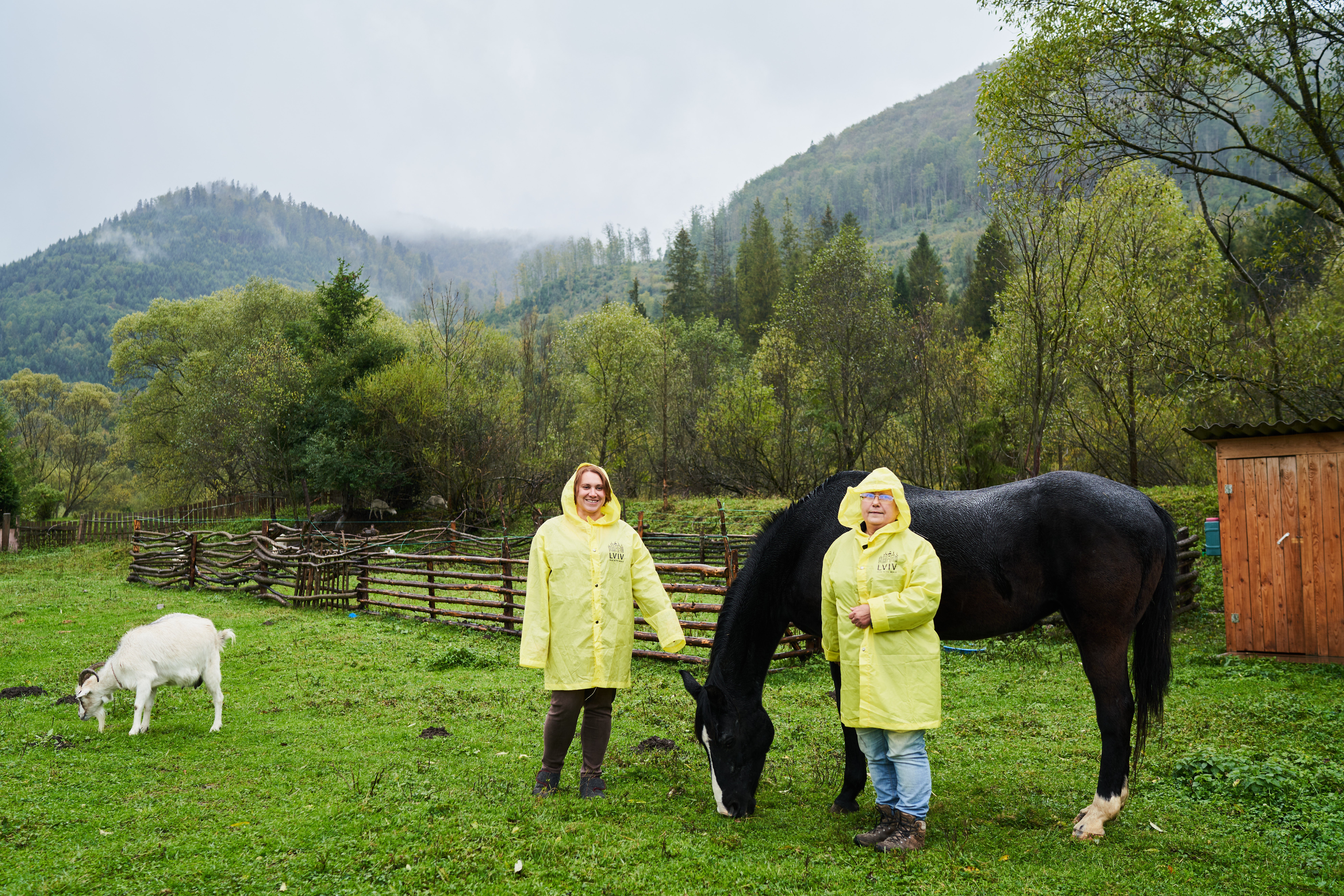
Kateryna Tarasenko (Lisova) and Kateryna Ilkiv, Lviv oblast
Perhaps, everyone in the Carpathians has heard about `two Katerynas`. In four years of
the company`s work, its owners Kateryna Tarasenko (Lisova) and Kateryna Ilkiv managed to turn their own business from a few goats to the whole farm of 45 animals. They have made one of the most attractive destinations for tourists in the whole region. And if most often entrepreneurs don`t know how to sell their products, women faced another problem – how to fully meet the clients` demand for cheese. To solve it, female farmers decided to set up a dairy cooperative. They have become silver medalists of the educational grant program ‘TalentA’ with their own project to restore farming in the Carpathians.
‘To say honest, our victory was expected. We are great optimists and we really believe that we are good. Recently we have realized that it was our sixth grant application and sixth win. It means that now we are having 100% hit,’ Kateryna Tarasenko (Lisova) said.
Agriculture is a relatively new activity for Kateryna Tarasenko (Lisova). Six years ago Kateryna was forced to move from industrial Alchevsk (a city of Luhansk oblast) to the picturesque Carpathians, where she got a fresh start and learned about cattle breeding. Previously she had been teaching marketing and had been working as a copywriter. The experience of the past years greatly helped Kateryna with their current business. Sharing a business, she is in charge of the organizational part, attracting investments and writing grant proposals. Kateryna Ilkiv is the one who is in charge of the cheese-making process. Mrs.
Tarasenko`s husband conducts the excursions, and Mrs. Ilkiv`s elder son takes care of goats.
Four family farms and some small agricultural sectors have already joined Katerynas` dairy cooperative. The plan is to have more members, but it is quite difficult. As Kateryna Lisova says, local people underestimate goat business, which is indicated by the fact that there are only 20 goats for the village of nearly three thousand inhabitants. It is also very challenging for women to hire some help because people just don`t want to work on the farm.
‘Katya makes cheese on her own. Sometimes I help her, but it`s not enough to meet the demand in high season. We would be happy to, but it`s very difficult to find a person who would be ready to work with a cheese-making process. The thing is not about skills, it`s about desire. You can always teach someone, who shows his willingness,’ Kateryna Lisova claims.
This year women have a plan to attract youth and consider the option of their formal employment for one season.
The major clients of the farm are tourists, who come for excursions and cheese tasting. In one day Katerynas have about 150 visitors. Their attention is drawn not only to the high- quality and organic products, but also to the petting farm.
Despite the success of the business, female farmers never stop learning and taking part in different programs. As a result of one program, this spring Katerynas will launch showrooms for tasting their products just on the farm. Owners will meet the tourists in national costumes and set a good table in a welcoming family atmosphere. What you like the most there, you will be able to buy in farmers` shop.
Soon, Katerynas` farm will get organic certification, when the owners show the whole chain of production.
Kateryna Lisova says that ‘TalentA’ program helped her to better understand all the details of a grant application process. After this educational program and obtaining funding, farmers have reached financial stability basically for the first time.
‘We have managed to increase production 2-3 times. It allowed us to prepare feeds for all winter first time in 4 years. Also, we can buy a Dutch feed mixture for baby goats and
thus save on the milk, to use it on the cheese-making production. The previous 3 years were very difficult. Sometimes we had no money even for bread. But now we can afford to work systematically and forward-looking, ‘ Kateryna Lisova said.
Moreover, business partners created a tradition of holding meetings, where they discuss short-term plans and strategic policy. According to the entrepreneur, it is something new for them, because previously their work was more spontaneous, and they worked out problems only as they come up.
Also, quarantine helped women to understand how vital is it to have different channels of product distribution. So they have already entered into a partnership with three online platforms.
The main goal for both Katerynas now is to build their own farm in their land to not depend upon lessor. Meanwhile, women are continuing to do their work, preparing for a new season and looking for new business opportunities.

